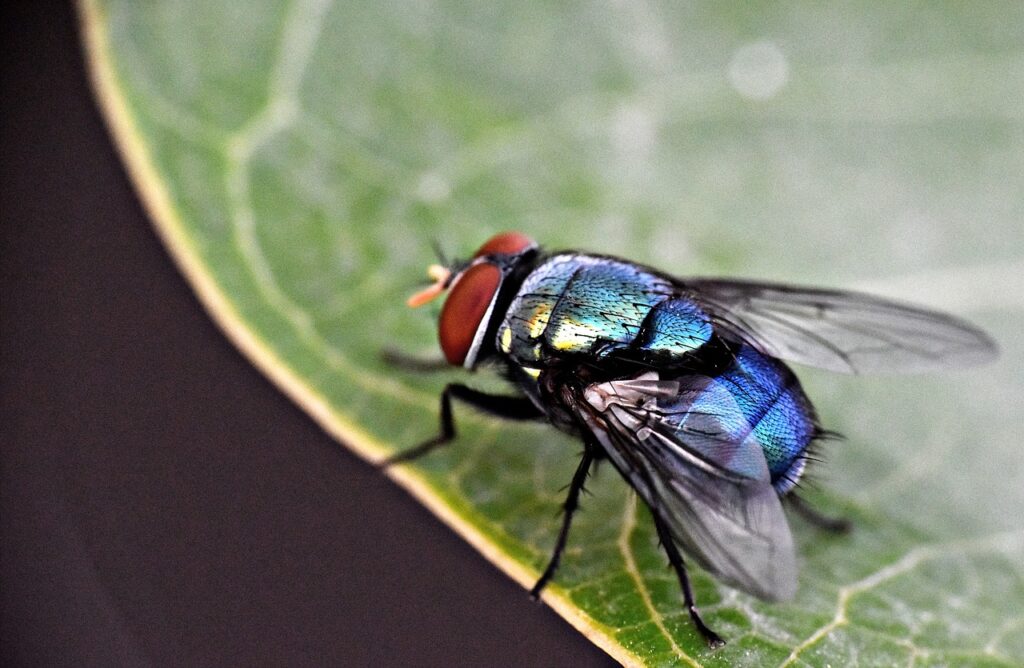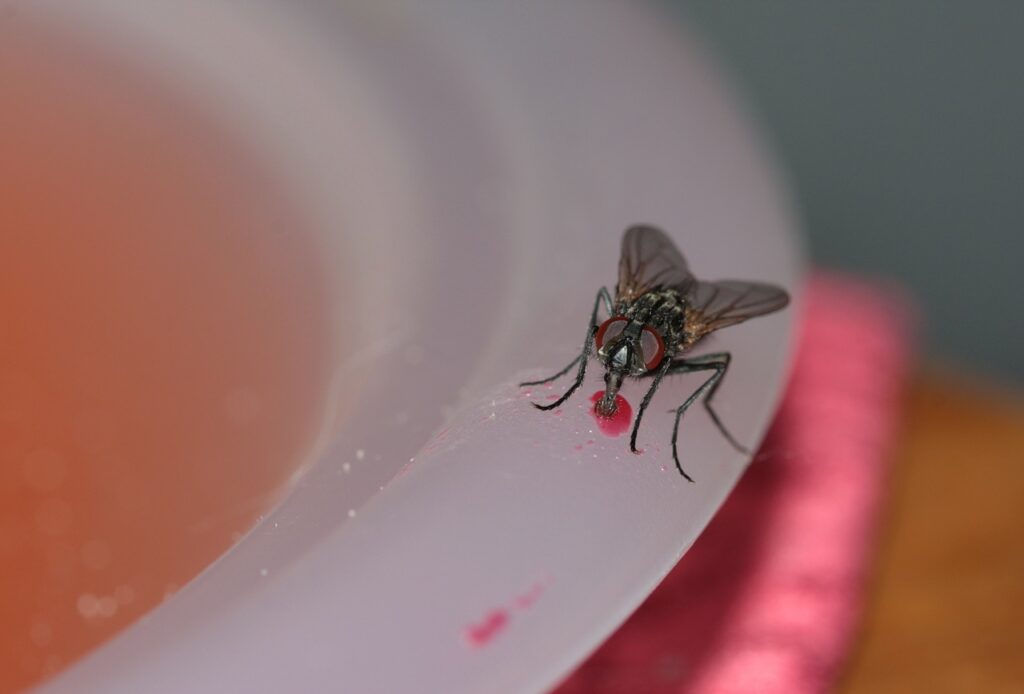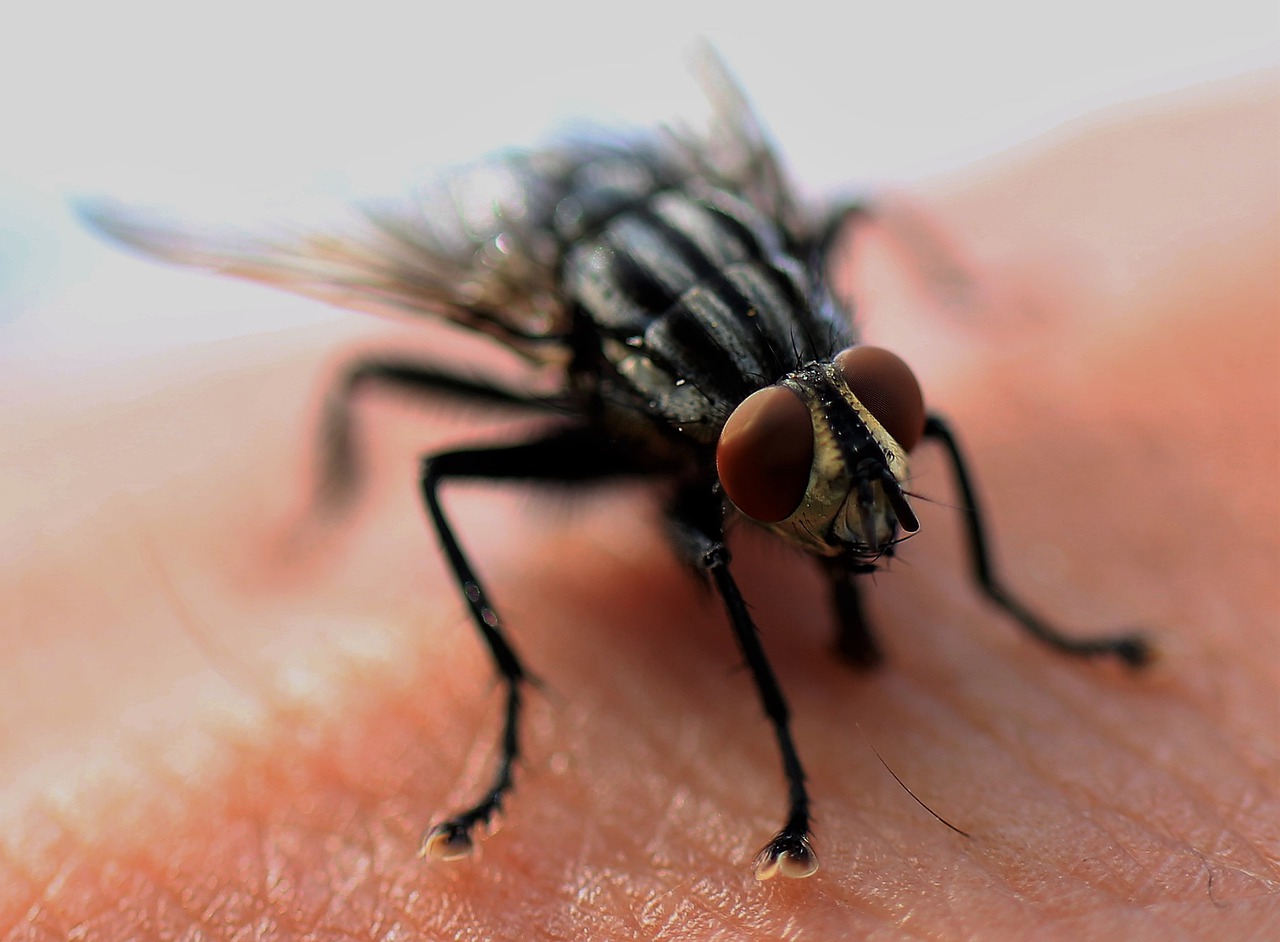Houseflies are not necessarily the first insects that come to mind when it comes to pest infestations. We usually think of bed bugs, fleas, termites, and other common pests. But you should not forget about the humble housefly… Houseflies breed very quickly, putting you and your family at risk of these disease-causing bacteria carriers. So, it is useful to know the housefly life cycle to help you to get rid of these revolting pests.
Housefly life cycle
The housefly life cycle has four phases: the egg phase, larva phase, pupa phase, and adult phase. This may sound complicated at first, but it’s simple and similar to the life cycle of many insects.
Egg phase
Male and female houseflies mate. And like many insects, the males don’t really stick around to see their offspring. The females search for a place where they can lay their eggs. Like many insects, the females don’t really try to care for or protect their eggs. Once they find a place that is safe and full of resources, they lay their eggs and leave them. They can lay over a hundred eggs at a time, and they can lay five or more times during their lives.
Housefly eggs are white and oval — like small grains of rice. You will usually see them on corners, crevices, gaps, and holes in places that are safe and full of resources for houseflies, like compost piles, garbage cans, and grass clippings.
Larva phase
Within 24 hours, housefly larvae will emerge from the eggs. These are more commonly known as maggots. They look like little white worms squirming around where their mothers have left them and looking for food.
Feeding and storing energy are the priorities of maggots as they transition to the next phase. This is the reason why you always see maggots feeding on animal carcasses, leftovers in garbage cans, and other organic materials. They will feed for about five days.
The maggots will shed their exoskeletons and grow new ones multiple times. This process is known as molting. Maggots will molt about three times before they migrate to darker and dryer locations for the next phase of their lives.
Pupa phase
After molting multiple times, the maggots will appear dark and solid with their skins acting like protective shells — pupas. Inside pupas, the maggots will finally grow into legitimate houseflies. They will develop the appendages and segments that make houseflies. This phase can last up to six days.
Adult phase
Houseflies don’t have teeth. This is the reason why they feed by dissolving food with their spit and sucking the dissolved parts. Because they don’t have teeth, they can’t chew on the pupas where they emerge. They bust out of the pupas using the large bumps on their heads.
Houseflies can live up to three months, but they usually die earlier because they have so many predators. Their average lifespan is only about 21 days. Despite this, they can be resilient pests because of how effectively they breed. The females are ready to reproduce only a few hours after emerging from their pupas, and they can lay almost a thousand eggs in their lifetime.

Why you should care about the housefly life cycle
You should care about the housefly life cycle because houseflies are much closer to you than you think. They can be in the garbage cans outside your home now, breeding and preparing to spread disease-causing bacteria around your property.
- Housefly infestations are no joke. There are a lot of ways for houseflies to spread disease-causing bacteria. They live in the most unsanitary places, so their bodies are full of bacteria and they leave these bacteria on everything they touch. They spit on your food, contaminating it with the bacteria you can find in their esophagus. And they urinate and defecate around your property, spreading the bacteria from inside their bodies even further.
- Understanding the pests can help you get rid of them more effectively. If you understand the pest you are dealing with — including their lifecycle — you are better prepared to get rid of them. You can also attack during their most vulnerable phases. For instance, you can get rid of maggots in your garbage cans by simply pouring boiling water all over them. Something so simple can save you from the trouble of dealing with a full blown housefly infestation.
- You can get rid of the elements that may let them thrive on your property. Pest control is not just about getting rid of the pests themselves. It’s also about making your home as unattractive to pests as possible. Now that you know that houseflies thrive even on the tiniest sources of organic matter, you can keep your home clear of these materials.

Knowing the housefly life cycle helps you to get rid of them
The best way to get rid of housefly infestations is by getting the help of pest control professionals. But if you want to be more involved, here are some quick and simple tips.
- Use commercial insecticides. Make sure to buy ones that say they can be used for flies. Follow their instructions carefully and diligently to avoid problems with effectiveness and safety.
- Try home remedies. If you want to go the natural route, you can try making solutions with water steeped with basil, cayenne pepper, or lavender. But remember that home remedies may not be as effective as commercial insecticides.
- Be smart with traps. You can buy commercial fly traps too, like sticky traps and zappers. If you are feeling merciful and you don’t want to kill houseflies, there are also traps that only contain them. You can release them afterwards, but make sure to release them far from your home.
- Keep your doors and windows closed. Your doors and windows are passageways to all kinds of pests. Keep them closed all the time. During warm months, consider using air conditioners and fans for ventilation.
- Always put food and water in containers. Remember that houseflies look for places where they have easy access to food and water. Make these resources inaccessible by storing them in cabinets, containers, and refrigerators. Don’t disregard pet food too.
- Practice proper waste management. Your garbage cans are full of resources for houseflies. Make sure that they are inaccessible too by keeping their lids down. Avoid piling up too much garbage in them that you can’t put the lids down anymore.
Get rid of houseflies today
Houseflies are very common pests. They breed quickly and spread disease-causing bacteria effectively. You have to understand the housefly life cycle, so you are more equipped when you are trying to get rid of these underrated but dangerous pests.

